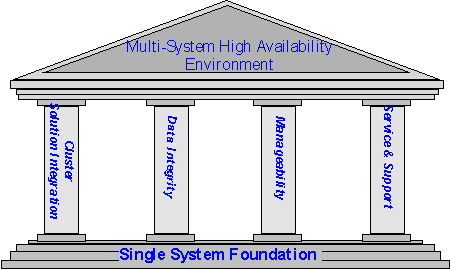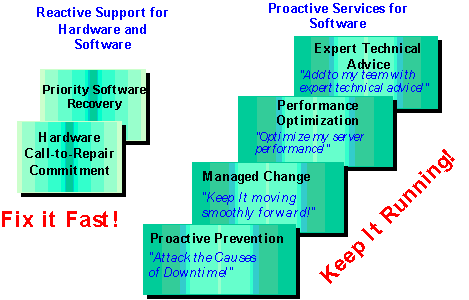
Figure 1

In 1996 Hewlett-Packard NetServer Division (NSD) announced its engagement in an aggressive High Availability program. This paper’s objective is to describe the strategy of NSD’s activities in this exciting field.
Strategy:
NSD has designed its strategy based on more than 20 years of experience in a High Availability environment in MPE and UNIX. We have in many cases leveraged the products and the technologies that HP has built overtime on these other platforms to create the most complete solution in the Wintel market.
HP’s strategy for High Availability on Wintel servers is constructed around five key fundamental elements which are represented in figure 1.

Figure 1
In the following paragraphs, we will define each of these elements in more detail.
Single System HA, THE FOUNDATION
Single System HA features encompasses any functionality within a single server designed to improve the availability of the server. For example: ECC Memory, Raid technology, and redundant components are designed to make the servers more reliable without requiring the use of any clustering technology.
Today, NSD servers have already numerous Single System HA features listed below. Those HA capabilities have been built into Servers over the last four years.
One of the ways to improve the availability of an application is to make the whole server redundant and add on each server intelligent middleware that will manage the communication and synchronization of both servers. This is achieved by the Clustering techniques that are now available on the Wintel platforms.
Since mid 1996, NSD has been committed to providing clustering solutions on the
NetServer product line. Our strategy is to work very closely to supply an industry
standard solution based on the Microsoft Cluster Server (MSCS) while providing the largest
choice of scaleable configurations. Scalability in this case is obtained by the large
number of combination of SPU’s of different power with the largest combination of
storage solutions.
The initial configurations were released in November of 1997 and have been well received
by many of our customers. We are continuing to add more configurations to cover NSD
products more thoroughly.
As we recognize the need to extend our clustering middleware to other products other than MSCS, we have tested NetServers with a third party clustering software from Vinca, Octopus and NSI.
Clearly NSD is committed to its strategy to lead with MSCS and continue to expand the choice of other clustering software.
In Phase II of MSCS, Microsoft will release a four nodes cluster feature that will definitely enhance the scalability of the cluster. Our goal is to provide an industry Standard solution with MSCS. We will surround MSCS with add-on (like ClusterView) that encapsulate the vanilla product from Microsoft.
We are continually expending the number of supported configurations and we are now including low-end servers in our portfolio.
We have also improved the way clusters are delivered and installed at customer sites. Our goal is to have a cluster delivered in a "ready to run" state with even customized information like IP addresses pre-loaded.
In the future we will continue to add more choices for the customer by testing more non MSCS software, for example LifeKeeper from NCR.
.
Manageability encompasses any aspect of the management of a High Availability solution. From the single system HA features to the most complex clustering software tools. Manageability is contributing in the simplicity of the solution, which can have a great impact on HA, especially considering that HP internal statistics show that in the Wintel space 18% of the causes of unplanned downtime are due to user errors.
On HP servers, manageability has been included in a single system HA as well as
clustering. For example in SSHA, ECC memory is "manageable" in a sense since it
will report to an OpenView console errors.
On the Multiple System HA front, NSD has worked with the HP UX division to make
ClusterView MSCS aware. The benefit of this product is that it provides a good Coexistence
between Windows NT and Unix since it allows customers to use the same management framework
for both environments. It is extremely important for many Enterprise customers who want to
surround their UNIX environment with Windows NT solution and manage all their servers in
an integrated manner.
By data integrity, HP includes any product and features designed to protect the data in an HA environment. It is unfortunately a common misconception that clustering technology protects data. Data must be protected by other means since Clustering (especially MSCS) relies on Hardware to protect the data against disc failure.
Hewlett-Packard includes in Data Integrity both data on disc and data on backup. This includes all the storage technologies like Raid and the Backup technologies.
Today NSD provides scaleable choices of safe storage solutions.
For mass storage from NetRaid, to AutoRaid to FC/30 to EMC. The HA solutions we propose
have the storage capacity and the reliability most customers are seeking.
For Backup hardware, from the Surestore products to the DLT libraries, HP backup mechanisms offer the best product for reliable fast backup.
For Backup software with Omniback, we provide customers one of the best products for Network Backup in multi-platform environments. Omniback enables customers to backup most of the databases online. In doing this customers can greatly reduce their planned downtime.
To achieve a high level of availability, HP’s experience in the UNIX environment has determined the need for a strong set of specific services and support products. There are in fact two categories where we can classify those. The "Keep it running" category that consists in all the preventive aspects of service and support and the "Fix it Fast" category that encompasses the reactive aspect.
HP provides on NetServer one of the most comprehensive set of services and support
products for NT. The Scaleable services introduced in late 97 are inspired from mission
critical services available on HP-UX. The specific products that have been introduced for
NT clustering are the "operational Check-up", which was designed to verify the
readiness of the customer’s computing environment. The other service is the cluster
installation product that consists in the setup, installation and test of the hardware and
software of an MSCS configuration.
Conclusion
Hewlett-Packard takes High Availability in the Wintel space seriously and is providing a comprehensive suite of technologies, products and services that can bring customers’ downtime down. When some of our competitors on the Wintel space are trying to get "in the game" of High Availability, Hewlett-Packard really demonstrates its capacity to leverage its strong experience in this field and apply it to the Wintel space. In the last year numerous successes in large enterprise environments have proven the trust customers have in HP in this field.